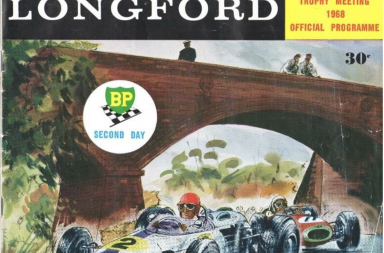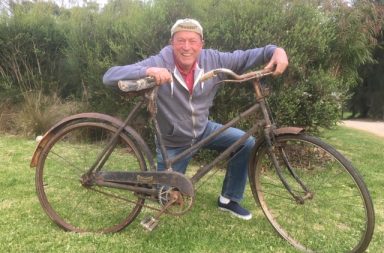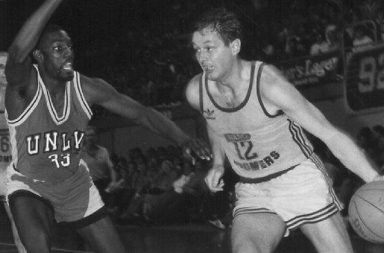Written October 2006
FRED Kearney died in his sleep on Tuesday. He was 92. At his request, the death notice didn’t appear in his local paper until after he was cremated.
He asked for the notice to be brief and he wanted no mention of his war service.
Fred shunned attention. He settled for a private cremation only after I explained to him a few years ago that we wouldn’t be allowed to dig him into the garden bed under the plum tree where we buried the dog. Even when I reminded him that the house where the dog was buried hadn’t been outs for 15 years, and that the occupants might not appreciate us digging up their back yard. He still wasn’t dissuaded.
Fred would hate me writing this – he’d call it bullshit – but he was of a breed that we won’t see again and I feel this unauthorized obituary needs to be written.
Every son thinks his old man is indestructible. I firmly believe that Fred was.
There were so many times he should have died, but his iron constitution always got him through.
I remember once when I was nine or ten, and he was building a road for the local council. I was watching from about 10 meters away as he poured bitumen out of a tanker onto a stretch of gravel. The thick hose he was holding became disconnected from the tanker and burning tar spewed all over his arms, chest, neck and back.
I can still see the look of shock on his face and I can hear the deep, guttural howl that reverberated through the air as he ran down the road and dived on to the tray of a council utility.
He was in hospital for months and his skin was marked for life. The accident was the fault of a workmate, but Fred never thought of seeking compensation. He wasn’t that sort of bloke. In Fred’s book, you copped whatever came your way and you made the best of whatever situation you were faced with.
When he came home from the Second World War, emaciated, suffering malaria and emotionally wrecked, he told the doctors he simply wanted to go back to work.
He didn’t mention the bullet in his back or the unspeakable horror he had endured during three and a half years in one of the most inhumane prison camps of history, the Thai-Burma Railway.
Only years later did his family learn he was just 8km from Nagasaki, a captive of the Japanese when the first atomic bomb was dropped. Because he protested his good health to his discharging officers, public servants deemed for the next 40 years that he hadn’t suffered during the war.
There was no complaint from Fred.He just wanted to do his manual labor, swinging a pick or axe, or wield his shearer’s hand piece. They were his way of relaxing, his type of meditation.
After his release he went cane cutting in North Queensland, and those long hot days of back-breaking work gave him some of his sweetest memories. Hard work sustained Fred all his life.
To my knowledge, he talked about the war only once – with my wife, back in the mid-90s, when a television show they were watching sparked him to reminisce about being a prisoner in Japan and swimming in the bay to catch and eat raw eels.
Fred married my mum soon after he came home. Life must have been terrible for her, coping with a man whose emotions were so messed up that he couldn’t show affection.
By 1949 they had two children. Mum milked the cows and raised the kids on their small farm outside Longford, in Tasmania’s midlands, while dad travelled the mainland shearing. He was away from April until October every year for 15 years. Every fortnight he sent home a letter accompanied by a cheque for his past fortnight’s wages.
Mum had to walk 8km just to go shopping in Longford, leading my brother and sister, and wheeling me in a pram. My aunty, the last remaining of Fred’s six brothers and sisters, told me on Tuesday that dad only learnt to be a father after I was born. By then he was 40. To me, he was a caring dad. But his anti-social behavior was hard to comprehend, particularly the hiding under the bed when visitors called.
‘The railway’ was always a dark, brooding secret in our house. We knew not to ask about it. The trauma haunted him all his days. In his sleep he murmured about wartime experiences. He often shouted so loud that he could be heard all over the house.
Fred found relief in physical work – the rhythmic exercise, the freedom of feeling the wind and rain in his face, the contentment of doing a job to his satisfaction. Although he left school at 14 to run a milk round and was building roads by the time of the Great Depression, he always loved to read. The local library never had a more eccentric card holder. He would select three books a fortnight, hide them under his coat and take them out without getting them checked or his card marked. He never stole a book. He just couldn’t see the need for the formalities.
Ironically, I think the turning point in Fred’s life had nothing to do with his renowned physical hardness. It came about when mum and dad put aside their own lives to help my sister at her time of greatest need.
Her marriage broke down when she had four kids under four. Fred went soft for those kids and became their surrogate father for the rest of his days. My sister, a survivor like her father, bravely overcame considerable difficulties to bring up four children who are all fine adults with children of their own. Mum died of cancer in 1980 and dad lived alone until 1994, when my wife and I moved back from Melbourne to a farm near Longford. Our farm had two cottages – one for us and one for Fred. Every morning our two young daughters sprinted down to Pop’s because he put all the sugar they wanted on their Weet-Bix. He and I worked together on the farm for several years – well he worked and I handed him the tools. Instead of boring holes with a mechanical post hole digger, Fred drug through gravel and rock with a crowbar and scooped it out with a long-handle shovel. Two minute jobs took two hours, and he relished every painstaking second of it. He was a proud bugger. One night my wife and I discussed getting a tree feller to remove a limb that was hanging over our cottage. We explained tactfully to Fred that the job was so difficult and dangerous that we should hire a professional. Next morning we were woken at 6am by a chainsaw. Fred was halfway up the tree, straddling limbs, proving to us and he and his saw were up to the task.
Two car accidents in his early 80s almost killed Fred. His heart stopped beating after the first crash but, fortunately, the other driver was able to bring him back to life. A year later he was struck by a car in Longford’s main street and flung high into the air. Following yet another remarkable recovery we nicknamed him ‘the rubber man’.
For Fred the war was only ever something he wanted to forget. He saw no glory in it. He never joined the RSL, never marched in an Anzac parade and only attended one Anzac Day service in 60 years. That happened to be in his last year and I did it by trickery. We knew his end was nigh, so on what would be his last Anzac Day we pushed him in his wheelchair to Longford’s cenotaph a few minutes before the 11am service. We parked him in a position where the crowd grew around him. He so enjoyed being surrounded by familiar faces that he didn’t realize he’d been duped.He sang beautifully during the service; for a tough bloke, Fred had a terrific voice.
After the call came from Longford’s aged care centre last Friday to say he had lost consciousness, my sister and her children drove for more than two hours to hold his hand throughout the night. We spent the next three days at his bedside; that iron constitution was never going to shut down without a fight.
When the old warrior breathed his last, at 5am on Tuesday, I found myself whispering in his ear the names of his grandchildren and great grandchildren.
My greatest regret, however, was that – while he learnt to be a staunch father and a wonderful Pop – he hadn’t shown mum the affection she deserved. Perhaps if she had lived longer and they had grown old together?
On Tuesday morning, a few hours after he died, a nurse stopped me and asked who Annie is.
I told her that Annie is my 14 year-old daughter. The nurse explained that on the night Fred began to lose consciousness, he continually cried out for Annie. A lump swelled in my throat. Mum’s name was Annie.



